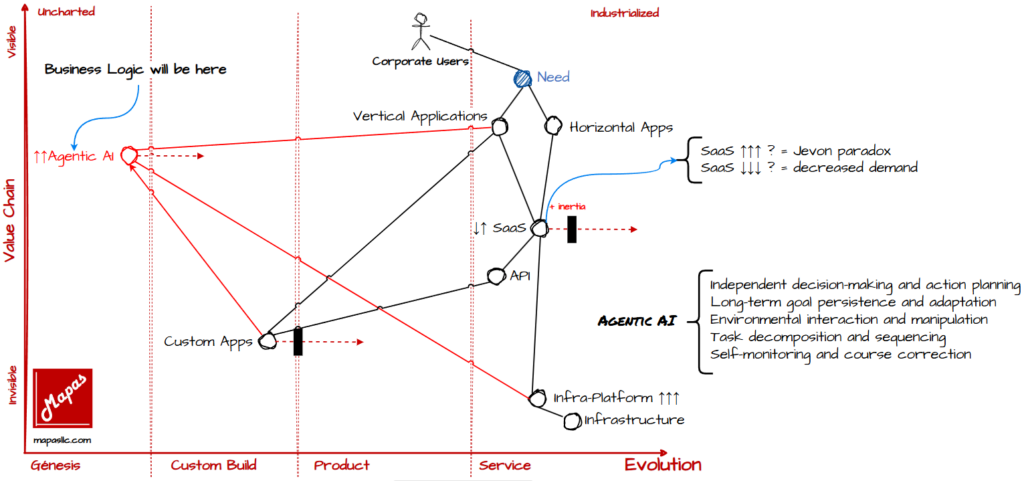Agentic AI as a field of exploration is raising as fast as new use cases are being discovered.
Today I was looking at this territory from the perspective of the impact on the consumption of SaaS from the corporations.
Let’s start with the abuse
Some SaaS companies build and maintain a healthy relationship with their customers, but there are other SaaS firms that once you are in, they start to enshitify the relationship and they trap the client into loops of deterioration of the service or the increase of rates or layers of subscription. Competition provokes this type of collateral effects and it’s there where the real relationship shows up.
What about Agentic AI?
Agentic AI is becoming a buzzword, I use a simple classification diagram to differentiate between the different types. It is this one:

Let’s define Agentic AI as “system designed to autonomously pursue goals and take actions in an environment”.
Let’s list some of the solutions that are available now in the market to do it:
| Category | Solutions |
| No-Code/Low-Code Platforms | ChatGPT by OpenAI, Dialogflow (Google Cloud), Microsoft Power Virtual Agents, Rasa Open Source/Rasa Pro, Landbot.io |
| Developer-Centric Platforms | LangChain, Hugging Face, IBM Watson Assistant |
| Open-Source Frameworks | FastAPI + GPT APIs, Haystack (deepset.ai), Botpress |
| Specialized Platforms | Ada, Replicant.ai, Turing.ai |
| Ecosystem-Specific Platforms | Zapier + GPT APIs, Salesforce Einstein GPT, ServiceNow Agent AI |
So now what!
Companies uses vertical (specific for their purpose) and horizontal (standard for the industry or all) software solutions. Many of them are SaaS and some others are products or custom build solutions (done in house or provided by a partner).
SaaS environments act many times as integrators and they are trying quickly to introduce their Agentic AI solutions into the clients.
Why?
Many causes:
- Revenue,
- Increase the moat and get the client working inside of their platform (avoid the client jumps into other platform).
- Enable themselves to learn about how to build it and discover new use cases,
- Create specific agents focused on specific tasks or knowledge areas, providing a better accuracy in the actions executed.
- and more….

What would be the impact of Agentic AI on SaaS?
Will the consumption of SaaS solutions increase ? (due to the Jevons paradox)
Jevons paradox states that when technological progress increases the efficiency of using a resource, its consumption often rises rather than falls, as the improved efficiency makes the resource more economically attractive. SaaS continues increasing its efficiency, all the improvements done in semiconductors that are enabling AI solutions to emerge are also being used by Infrastructure platforms and prices of SaaS should decrease.
Will the consumption of SaaS solutions decrease? (due to the user jumps into other platform)
Some SaaS are could fail understanding how to enable Agentic AI into their solutions or fail not being able to provide the right quality.
There is another factor and its is the Intellectual property. Companies are going to “write” or build part of their core business logic into these third party solutions. Is that the right move to make? Here the CIO, CTO and engineering departments have to pay a lot of attention about where they build these capabilities, especially if they do it in “Ecosystem-Specific Platforms”.
Takeaways
What is really going to happen?
I don’t know, right now if I have to make a bet I would say that main SaaS platforms as Salesforce, ServiceNow are going to increase the consumption of their services.
Microsoft and Amazon will be the ones providing “showels” to the rest of the world (as all this is going to be implemented on Infrastructure platforms and they are the main players).
As usual, any constructive feedback is welcome.